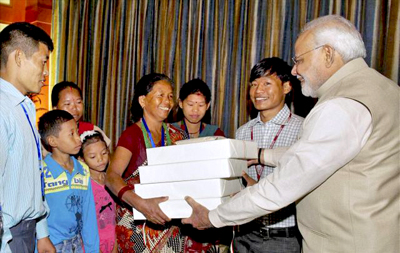Kathmandu, Aug 3: Prime Minister Narendra Modi on Sunday personally handed over a Nepalese youth to his parents here having nurtured him for 16 years. 26-year-old Jeet Bahadur, who is currently pursuing BBA in Ahmedabad, had come to India in 1998 along with his brother looking for work .
 Bahadur came in contact with Mr. Modi in Ahmedabad over a decade back and was since looked after by him. He travelled with the Prime Minister to Kathmandu to be personally handed over to his mother and elder brother.
Bahadur came in contact with Mr. Modi in Ahmedabad over a decade back and was since looked after by him. He travelled with the Prime Minister to Kathmandu to be personally handed over to his mother and elder brother.
At the hotel where the Indian delegation is staying, Prime Minister Modi met Bahadur's family members who have moved here from their native place Kawasoti in Nawalparasi district in western Nepal where they live in a slum area. His family members include his mother Khagisara, elder brother Dasharath, his wife and younger sister Prem Kumari. “Bringing a family together! @PMOIndia 1st engagement in Nepal was to bring together Jeet Bahadur's family,” Spokesperson in the Ministry of External Affairs Syed Akbaruddin tweeted along with a photograph of the Prime Minister with Bahadur's family.
After coming to India with his elder brother, Bahadur worked in Rajasthan for a brief period. However, after sometime he decided to return to Nepal as he was unhappy with his job. While leaving Rajasthan, he mistakenly boarded an Ahmedabad-bound train instead of one going to Gorakhpur in Uttar Pradesh, which borders Nepal.
On arriving in Ahmedabad, a woman took him to the house of Mr. Modi who had till then not become the Chief Minister. Since then, Bahadur had been in Mr. Modi's care. However, after Mr. Modi became the Prime Minister and moved to Delhi, Bahadur shifted to the university hostel. Indian Embassy officials in Kathmandu earlier visited Bahadur's family in Kawasoti and informed them about Mr. Modi's visit and his desire to meet them.
On the eve of his two-day trip on Saturday, Mr. Modi had tweeted, “On a personal note, my Nepal visit is very special...Some personal emotions are also attached to this visit.”





Comments
Add new comment